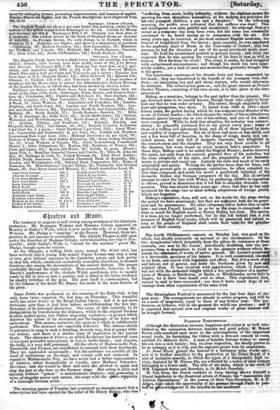"suffering from, acute, bodily infirmity, without the slightest Means for
meeting his own immediate necessities, or for making auy.prOvision for his two youngest children, a son and a daughter." On the following morning, the public were informed that the sufferer was dead! This sad intelligence was alike painful and unexpected : for although Bishop's career as a coinposer has long been over, yet his name has °constantly continued to be heard among us in connexion 'with his art. Not many years ago, he received, as the moat eminent English musician, the honour of knighthood from the Queen ; more recently, he was appointed to the academic chair of Music in the University of Oxford; only last autumn he had the direction of one of the great provincial music meet- ings. He held his accustomed position in general society ; and every one supposed that he was passing the evening of his days in east as well as honour. How far from the truth! For years, it seems, he had streggled with embarrassed circumstances ; and though his death has been appa- rently sudden, yet a load of cares and anxieties has gradually brought him to the grave.
The benevolent exertions of his friends have not been suspended by his death ; they are transferred to the benefit of his youngest twin chil- dren,—an interesting boy and girl about sixteen, who would otherwise be destitute. The subscription goes on ; and the great concert at Covent Garden Theatre, consisting of his own music, is to take place at the time announced.
Bishop, as a musician, belongs to the past rather than the present. His age does not seem to be exactly known, though those who ought to know best say that he was under seventy. His career, though singularly bril- liant and prosperous, was short. It lasted from 1809 to 1824—about filteen years, the period during which he was composerand director of the music of Covent Garden ; for which theatre the whole of his multitudinous dramatic pieces (except one or two of his earliest, and one of his latest) were composed. While he held that situation, his industry was extraor- dinary: he generally produced five or six pieces every year • many of them of a trifling and ephemeral kind, and all of them injured by haste and rapidity of composition. But all of them had more or less merit, and not a few were full of beauties in the shape of songs, duets, and con- certed pieces, not only full Of dramatic character, but delightful in the concert-room and the chamber. They not only drew crowds to all the theatres, but were found on every musical lady's pianoforte. In those days, Bishop used to be called the English Mozart ; and he deserved the name, not only from the natural, graceful flow of his melodies, but the clear simplicity of his style, and the adaptability of his draniatio music to private and social use. Latterly his style lost much of its early originality and purity. Writing for the pocket more than for fame, and preferring present gain to permanent reputation, he often compiled ra- ther than composed, and made his music a patchwork imitation of the favourite Italian and German composers of the day. His ill-advised attempt to enter the lists with Weber, by producing Aladdin in opposition to Oberon, proved so disastrous that it led him to abandon dramatic com- position. This was almost thirty years ago : since that time he has only produced for the stage two or three trifling adaptations of foreign pieces, which are forgotten. Bishop's reputation, then, will rest on his works for the stage daring the period we have mentioned; but they are sufficient both for its great- ness and its permanence. No other composer, either before him or after him—not even Purcell himself, in so far as the stage is concerned—has done so much for English music as Henry Bishop hae done. His operas, it is true, are no longer performed, but he has left behind him a rich treasure of English vocal music, which will be preserved and valued so long as the people of England shall retain their testa for the genuine music of their country.


































 Previous page
Previous page